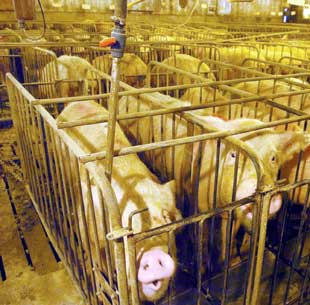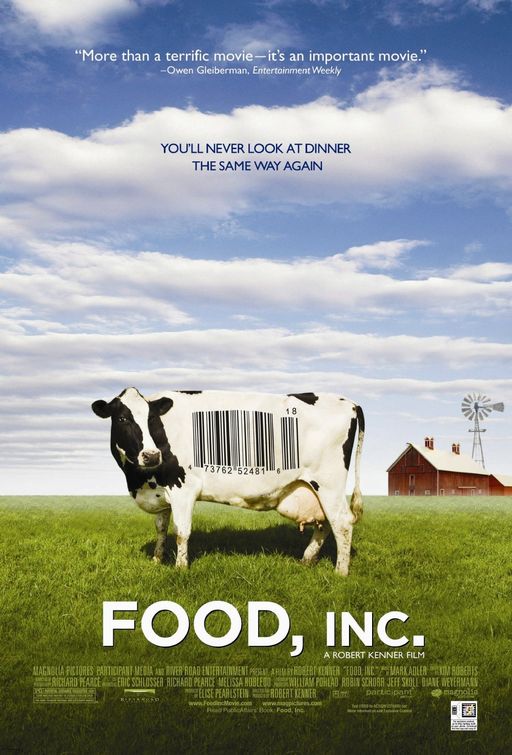Food is pretty awesome; I mean we live off the stuff… literally. We all enjoy sitting down for a nice meal but do we ever think of where this food we’re eating is coming from? The agriculture industry is such an important part of our world but many of us no little to nothing about it, me included. I don’t know where the tomatoes in my salad come from or the pepperoni on my pizza…
  |
http://kenokazaki.com/wp-content/uploads/2010/12/FullPlate-Melih-Kesmen.jpg and http://torontoist.com/attachments/toronto_patrickm/2008_04_07_loblaw.jpg Where does your food come from? Buy your groceries from Loblaw? Is it really great food? |
Ø Industrial agriculture is the modern farming technique that refers to the industrialized production of livestock and crops. The methods used to produce this food include mostly machinery, genetic technology, chemicals, hormones and antibiotics.
Ø Sustainable agriculture is basically the opposite; it is farming while keeping in mind the affects on the health and sustainability of the environment, the economy and us, the ones who eat the food.
  |
http://tasmaniantimes.com/images/uploads/Lukas2_TasDevil_thumb.jpg and http://tiki.oneworld.net/food/sustainable_farming.gif Industrial Farming v.s. Sustainable Farming |
Industrial agriculture provides most of the food in our supermarkets, especially in developed countries. This type of agriculture is much cheaper, much more time efficient in the amount it produces, and at to many, it seems the only way to keep up with the growing demand for food. Documentaries like Food Inc, have exposed the dirty little secrets of this growing industry and it is common knowledge that most, if not all, of our food is now genetically modified somehow. So, then if we know which option is better than why is there such as issue; because by 2050 there is going to be an estimated population of over 9 billion people on this earth and we need to feed all of them (United Nations News Centre). To keep up with this growth in the past, factory farming was invented and now provides 74% of the world’s poultry, 43% of all beef and 68% of all eggs (World Watch Institute). Factory farming is the process of raising livestock in a high density environment, the highest production rate and the lowest costs.


http://transitionculture.org/wp-content/uploads/food_inc.jpg and http://cruelty-free.org/environment/wp-content/uploads/2009/04/factory_farm.jpg
Food Inc was a documentary that “outed” the disgusting food industry in America
These pigs are kept like this 24/7 until they are slaughtered in this factory farm. The ethics of this is a huge part of the growing discomfort with using this method of farming. You can see how animal cruelty can be assumed in most cases and many are fighting the cruelty aspect of the issue. Others are against it because of the health impact to humans; the Centers for Disease Control and Prevention have identified that the use of antibiotics may create antibiotic-resistant pathogens; parasites, bacteria, and viruses may be spread, among many other things. Some are most worried about the terrible environmental impacts of factory farming, environmental degradation, pollution of water, air, soil, and the harmful use of a huge amount of pesticides.
| http://www.treehugger.com/World-Population-Growth-2050.JPG How are we going to feed the world's growing population? |
I commented on the blogs... http://caitlincosgrovebioblog.blogspot.com/ and http://bioblogstuff.blogspot.com/
Works Cited
"2050 High-Level Experts Forum: The Forum." FAO: FAO Home. Web. 15 Jan. 2011. <http://www.fao.org/wsfs/forum2050/wsfs-forum/en/>.
Biello, David. "Another Inconvenient Truth: The World's Growing Population Poses a Malthusian Dilemma: Scientific American." Science News, Articles and Information | Scientific American. Web. 15 Jan. 2011. <http://www.scientificamerican.com/article.cfm?id=growing-population-poses-malthusian-dilemma>.
"Boosting Agricultural Productivity Key to Feeding Growing Population – UN." Welcome to the United Nations: It's Your World. Web. 15 Jan. 2011. <http://www.un.org/apps/news/story.asp?NewsID=32503&Cr=fao&Cr1>.
"Nutrition and the Environment." Welcome to the Official Web Site Locator for the UN System OfOrganizations. Web. 15 Jan. 2011. <http://www.unsystem.org/SCN/archives/scnnews21/ch04.htm#TopOfPage>.
"World Summit on Food Security: World Summit." FAO: FAO Home. Web. 15 Jan. 2011. <http://www.fao.org/wsfs/world-summit/en/>.
Natasha, this blog is incredibly informative. I was unaware that Canada's population was ecxpected to grow that much by 2050, and I think that you raise a valid point of having inadequate resources to produce enough food for that mass amount of people. Your blog provided me a lot of facts that I would not have known otherwise, and your points helped my understand just how unacceptable industrial agriculture really is. No animal should be made to suffer, even if the population is expected to grow.
ReplyDeleteYour blog kept me intrigued the whole way through, thanks for the read!
-Rachael
Natasha, great job!
ReplyDeleteYour blog was amazing. It was extremely informative. You gave me a real insight on the differences between industrial and sustainable agriculture and which is clearly the better way of farming. I completely agree with Rachael's statement about how animals shouldn't have to suffer. I am an animal lover, and I find it really hard to hear anything that has to do with them suffering. Even when i was looking up pictures about farming, when i saw the animals in the small spaces, my stomach turned and I was really upset. That made me realize how unacceptable industrial agriculture. Even if the population continues to grow, sustainable agriculture is the way to go and I hope other people realize this as much as I have!
Thanks for the information.
Taylor
This comment has been removed by the author.
ReplyDeleteNatasha!!
ReplyDeleteYour blog was very informative. Our population is growing at a rapid rate and our environment is just not keeping up with our pollution. As if pollution wasn't enough, we now have to deal with industrial agriculture. We need to start having sustainable agriculture because in the end we all end up suffering. Companies need to start thinking about sustainability and not just profit. Farms are no longer farms, but rather they are factories and just manufacture animals. Most of our meats that we eat have been injected with hormones and antibiotics. This blog made me realize how important sustainable agriculture is.
Wayne
Natasha I loved this!
ReplyDeleteI made such valid points about how many people do not know were their food is coming from, because me myself never think about were anything I eat is actually coming from. Which brings to the point you made about how the farmers treat the animals. It's complete unethical how these farmers just have so many animals in tiny spaces I cant even image that people actually do that it so gross.. I completely agree that we are the future and need to change things, there's no way that what this industry is doing should go on much longer.